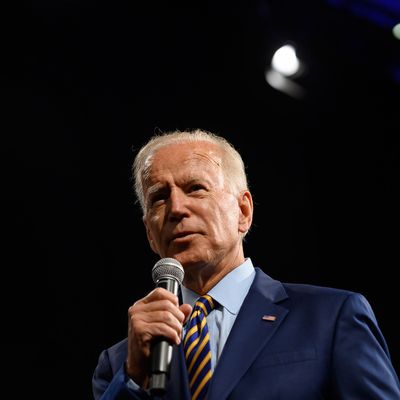
Ben: Five plus months out from the Iowa caucuses, Joe Biden continues to lead comfortably in national and state polls. But a recent New York Times story highlighted what has been seen as a central problem for his campaign: the “enthusiasm gap.” The gist is that prospective Biden voters aren’t thrilled about voting for him — they just think he’s got the best chance of beating Trump. The head of Monmouth’s polling institute was quoted as saying, of his time in Iowa: “I did not meet one Biden voter who was in any way, shape or form excited about voting for Biden.” First of all: Does this track with what you’ve been noticing on the campaign trail? There was some pushback to the idea that nobody really wants to pull the lever for him.
Gabriel: I’m always skeptical of the idea of an enthusiasm “gap,” partially because, well, when was the last election when we didn’t hear about one? It’s not rare! But I think the real answer has a few dimensions: (1) It’s definitely true, in my experience in Iowa and New Hampshire, etc., that the way Biden supporters, and even volunteers or organizers, on the ground talk about his candidacy isn’t really about inspiration or energy, but about winning. (2) It’s also true that no other candidate is really going this route, and no other candidates’ supporters use these terms when talking about their own pick. But! (3) This is Biden’s pitch! So it’s a strange dynamic: Obviously he’d love to fire people up, but his central bet is that he doesn’t need to, and that the notion that his enthusiasm “gap” is a problem misses the point. Embedded in that is the assumption that when it comes time for a general election, Democratic voters won’t really need firing up in the form of an inspiring candidate — the chance to oust Trump will be enough. We’ll see, obviously, if he’s right, but the truth is, he’s still winning, even if all indications are that his national numbers appear stronger than his early state ones, which isn’t always the best sign.
Ben: It’s true that Democrats probably won’t need a compelling reason to go to the polls against Trump. But haven’t we learned from previous elections that candidates who don’t actually inspire people all that much make for risky general-election candidates? Hillary Clinton comes to mind, of course, but others, too.
Gabriel: Hillary Clinton, John Kerry, Al Gore, Mitt Romney, John McCain …
Ben: Indeed.
Gabriel: It’s the classic problem. This is basically the whole reason that when you hear other Dem candidates make their case against Biden, they may not say it explicitly, but their central point is this: Wait a sec, are we sure he can actually win?
Ben: It’s certainly a legitimate question.
Gabriel: There’s been a lot written about how every voter is a pundit now, imagining some mythical average voter who loves a safe candidate who sounds a lot like Joe Biden. It’s a real problem, I think, that people think that way. (If everyone imagines someone else’s preferences in making their voting determination, no one will vote for themselves.) But the truth is also that Biden does beat Trump in head-to-head polling right now. Now, obviously, it’s insanely early for those numbers to be taken too seriously, but they do indicate that Biden’s opponents have had a hard time making this case.
If you think back to the first debates, a big reason Kamala Harris’s exchange with Biden appeared so (momentarily, at least) effective was that it seemed to expose Biden as out of step with the moment, and unprepared to mount agile counterattacks that can resonate in a modern political context. That’s a way of chipping at his “winning” image. However, the fact that Biden’s numbers haven’t really dipped since then in any sustained way means there may, actually, be something to it. I just keep thinking back to the extraordinary moment earlier this week, though, when Jill Biden straight-up said voters don’t need to like Joe; they just need to fall in line so Trump is gone. Have you ever seen something quite like that on the Dem side? (You could argue that Trump makes explicit coldly political arguments in public all the time.)
Ben: Yeah, that was really something else. The thing about that argument is that if the impression of rock-solid electability is dented, you don’t have much to fall back on. I saw someone point out that if Biden lost Iowa, the whole game might be up for him — more so than for other leading candidates.
Gabriel: Totally. And it’s why every other candidate keeps saying, “Our numbers elsewhere (South Carolina, Nevada) will improve the second we win or come in second in Iowa.” Everyone wants to make an electability argument; he’s just got a monopoly on it right now.
I mean, if he didn’t win Iowa he’d probably lean heavily on his Obama ties, which is his go-to move. That’s fine, and it may even be enough to right the ship. But we really should remember why this all feels so speculative: because he’s still winning in allll the polling!
Ben: So let’s say he’s still maintaining this lead in two or three months. How would his rivals — Warren, Sanders, and the rest — go about attacking him at that point? In other words, is every day he’s able to not screw this up just more evidence for voters that he’s the real deal?
Gabriel: Yes, they’ll attack him, but it’ll be hard for some of them. His favorability numbers are quite high, still, so going after him isn’t a simple matter. Did Harris get a big bounce after the first debate? Arguably, but only briefly. Did Booker, after the second? Not really.
I’d be surprised, actually, if Sanders doesn’t go there soon, but even then it’s dangerous territory when polling shows (surprisingly, maybe) that so many of Biden’s voters list Sanders as their second choice, and likely don’t want to see them fight directly.
Either way, though, we’re going to see these major three or four or five candidates start to engage each other much more directly very soon, either on the debate stage or elsewhere, simply because it’s time, with the caucuses five months away. But instead of going at Biden’s biggest strength — people like him and trust him — I think they’ll probably try to contrast themselves with his biggest weakness: He doesn’t inspire people the same way that they do. (Hey, look, it’s the enthusiasm gap!)
Ben: There’s that, and then there’s his age — and the fact that he shows his age — which is probably his biggest actual weakness.
Gabriel: Hard case to make explicitly when his two closest competitors are both in their 70s, too.
Ben: Yeah, as Margaret and Ed and I were discussing the other day, it wouldn’t be a straightforward task.
Gabriel: By the way, I don’t think these are necessarily unrelated. One’s ability to inspire an audience can be directly related to how one presents him or herself onstage at a debate or at a rally. So in that sense the fact of Sanders’s and Warren’s ages, simply as numbers, are not necessarily relevant.
Ben: Yeah — and unfortunately, I put Trump in that category, too.
Gabriel: Perhaps, but in a very different way.
Ben: Going back to where we started: Can you think of a candidate in recent history where the messaging was basically, “Well, you gotta vote for this person or else”? I mean, has this ever worked?
Gabriel: We have to be careful about how we phrase this, I think, and my initial answer above actually falls into a bit of a trap itself. This isn’t really what Biden always says on the campaign trail! He talks about restoring the soul of the nation, and about his work with Obama, etc. The very obvious subtext is certainly, “I can win and none of these losers can,” and sometimes that comes out to the forefront — his first Iowa ad flashes polls showing him beating Trump, and look at the Jill Biden moment last week — but, again, he’s making an anti-Trump argument out loud, not a tactical one.
Okay, with that out of the way … no, I can’t remember a candidate whose entire apparatus is this transparent about it. But that’s also because this race is soooo weird. The depths of the incumbent president’s unpopularity are like nothing we’ve seen before, and the field is still (RIP Hickenlooper, Inslee, Moulton, etc.) larger than any we’ve ever seen.
So the dynamics, I think, are skewed if we’re trying to make historical comparisons. There are obvious parallels to Clinton, or Kerry, or Romney. But if we’re being honest with ourselves, purely in terms of numbers there are also some (limited) parallels to Trump, who led a massive field from start to finish.
Ben: So you’re calling Biden the new Trump. We’ll end there.
Gabriel: To be fair, would Biden like that? No! But, uh, Trump did win.
Ben: Ugh, he did, didn’t he.





























